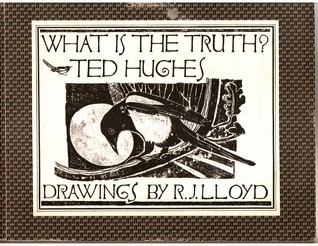What do you think?
Rate this book


1 pages, Paperback
First published January 1, 1984
So - what is a poem for a young reader? If they can recognise and be excited by some vital piece of experience within a poem, very young children can swallow the most sophisticated verbal technique. They will accept plastic toys, if that's all they're given, but their true driving passion is to get possession of the codes of adult reality - of the real world.
'I really would like to visit mankind,' he said. 'It looks quite exciting. Besides, travel broadens the mind.'
God put his arms around his Son's shoulders.
'Take my advice,' said God. 'Stay here. Mankind cannot teach you anything. Mankind thinks it knows everything. It knows everything bu the Truth.'
The Weasel whizzes through the woods, he sizzles through the brambles.
Compared to him a rabbit hobbles and a whippet ambles.
He's all the heads of here and there, he spins you in a dither,
He's peering out of everywhere, his ten tails hither thither.
The Weasel never waits to wonder what it is he's after.
It's butchery he wants, and BLOOD, and merry belly laughter.
That's all, that's all, it's no good thinking he's a darling creature.
Weight for weight he's twice a tiger, which he'd like to teach you.
And the air
All round the May hive
Twangs
Dangerously. Missiles.
Gingery gleams
Aslant through the ashpoles -
Telegrams
Coming in.
The bees fall
On to their knees, and humbly head-down crawl
Into their crammed church
Where they are fattening
With earth's root-sweetness
A pale idol, many-breasted,
Made of wax. The One
Who'll make their swarm immortal.
Bess my badger grew up
In a petshop in Leicester. Moony mask
Behind mesh. Blear eyes
Baffled by people. Customers cuddled her,
Tickled her belly, tamed her - her wildness
Got no exercise. ...
... Till a girl
Bought her, to free her, and sold her to me.
What's the opposite of taming? I'm unteaching
Her tameness. First, I shut her in a stable.
But she liked being tame. That night, as every night,
At a bare patch of wall the length of her cage
To-fro, to-fro, she wore at the wood with her nose,
Practising her prison shuffle, her jail walk.
... Already she hardly needs me. Will she forget me?
Sometimes I leave black-treacle sandwiches,
A treat at her entrance, just to remind her -
She's our houseproud lodger, deepening her rooms.
Or are we her lodgers? To her
Our farm-buildings are her wild jumble of caves,
Infested with big monkeys. And she puts up with us -
Big noisy monkeys, addicted to diesel and daylight.